
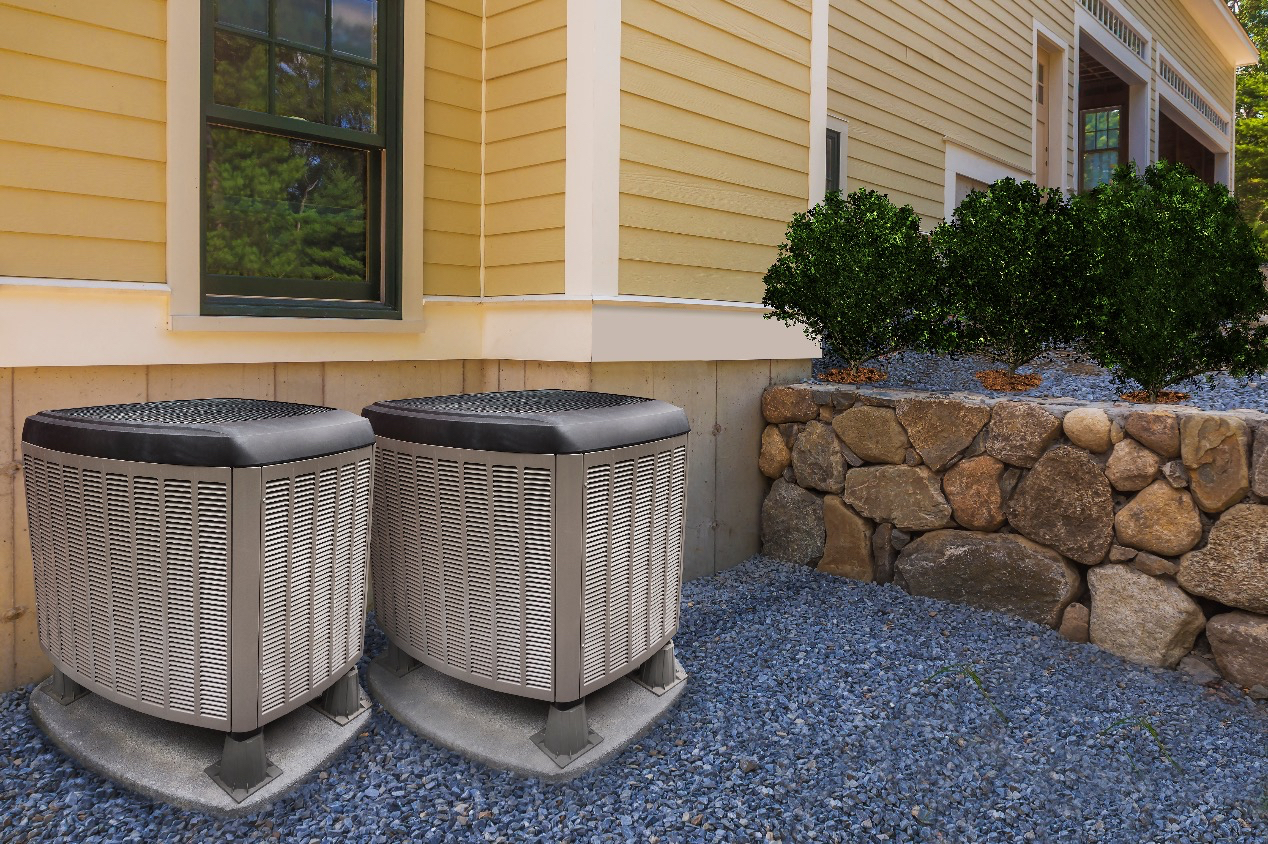
Left/Top: Photo: V. J. Matthew / Adobe Stock
Bottom/Right: Photo: saje / Adobe Stock
If you’re wondering which heating or cooling system wins the debate, there are several points to consider when comparing a heat pump versus AC. The biggest difference between air-conditioning and a heat pump is that a heat pump is for heating and cooling, while an AC is only for cooling. Other main differences lie in costs and durability.
On This Page:
- What Is a Heat Pump?
- What Is Air Conditioning?
- Appearance
- Cost
- Upkeep
- Durability
- Installation
- Life Span
- Environmental Impact
- Resale Value
- Which Is Better for Your Home?
- Heat Pump and Air-Conditioning vs. Other Options
What Is a Heat Pump?
A heat pump works both as an air conditioner and a heater. Setting the thermostat to “cool” or “heat” will adjust its cycle to create cold or hot air. A reversing valve built into the compressor can channel air (which the refrigerant cools) or let it remain hot in a reversed cycle. The main types of heat pumps are air source, geothermal, gas, and ductless or mini-split.
What Is Air Conditioning?
Air conditioners function identically to a heat pump’s “cool” setting. The only main difference is that air conditioners can only cool down the air and cannot reverse the cycle to create heat. When trying to buy the best AC unit, keep in mind that they are often paired with a furnace to meet the home’s heating and cooling needs. Air conditioners have four main parts that work together to cool down and dehumidify the outside air.
Appearance
Both heat pumps and central air-conditioning units have an outdoor and indoor component. You can usually tell which type is on a home by the physical appearance of the outdoor unit.
| Heat Pump | Air-Conditioning |
|---|---|
| Thin, rectangular shape | Bulky, rectangular shape |
| 250 pounds | 150 – 200 pounds |
Heat Pump
Air source, geothermal, gas, and mini-split heat pumps have an outdoor unit that usually has a thin, rectangular shape with a circular opening for the fan. Except for the mini-split, these units have a backup furnace and interior coils inside your basement, crawl space, or mechanical room. Meanwhile, mini-splits require a second interior unit that’s long and rectangular.
Ducted heat pumps weigh 125 to 800 pounds, although most units fall within the 250-pound range.
Air-Conditioning
Central air-conditioning units are located outside and require indoor evaporator coils on the furnace. The actual unit size depends on the British thermal units (BTU). BTU measures how much energy your AC will use per hour. It’s also easy to determine which unit size you need based on the square footage of your home—you need 20 BTU per square foot.
A 36,000 BTU air conditioner is around 29 inches wide, 29 inches long, 33 inches high, and weighs 200 pounds.
On the other hand, a window unit is a lot smaller and fits in most window frames. They usually weigh 25 to 130 pounds.
Consult With a Local HVAC ProCost
When considering the cost of a heat pump versus air-conditioning, you should account for the cost of future electrical bills and the unit price.
| Heat Pump | Air-Conditioning |
|---|---|
| $700 – $2,800 for the unit | $1,700 – $3,300 for the unit |
| $5,000 – $8,200 installed | $3,700 – $7,200 installed |
| $850 per year for heating and cooling bills | $300 – $1,200 per year in cooling bills |
Heat Pump
The average cost of a heat pump is between $700 and $2,800 and geothermal heat pumps cost $2,200 to $4,420. With labor, you can expect to pay around $5,000 to $8,200. If you opt for a mini-split, costs can be less. A ductless heat pump costs $1,300 to $8,000.
Higher SEER scores mean that your unit will use less energy. If you use an efficient model, you can expect to pay around $850 for heating and cooling each year in a temperate climate. Generally, electricity bills for heat pumps tend to run about 20% to 70% less than traditional central air conditioning systems.
Air-Conditioning

Photo: Jirawatfoto / Adobe Stock
The average cost of a central air conditioner ranges between $1,700 and $3,300. After labor, the total cost to install air-conditioning is $3,700 to $7,200.
Note that to have heating capabilities, you’ll have to install a furnace as well. A new gas furnace costs $2,500 to $4,600 for a 60,000 to 70,000 BTU unit with installation. Considering this, heat pumps cost less because you only need one unit for your heating and cooling needs.
Utility costs also depend on the SEER (Seasonal Energy Efficiency Ratio) score. This scale measures how efficient a cooling system is. It indicates the total cooling output divided by the energy used to power it. It starts at 1 and increases with the model’s efficiency.
If it’s an efficient 13-SEER system, expect to pay around $300 for a standard cooling season, although if you live in a hot area the bill can run as high as $900 to $1,200.
Upkeep
Both heat pumps and air-conditioning units require similar maintenance schedules. And in the event something goes wrong, repair costs are comparable.
| Heat Pump | Air Conditioning |
|---|---|
| Maintenance 1 – 2 times a year | Same as a heat pump |
| Repairs cost $160 – $620 | Repairs cost $170 – $620 |
Heat Pump
To keep your heat pump in good working order for its entire life span, you should have professional maintenance done at least once a year, or twice a year if you use it heavily. The pro will do necessary maintenance like lubing motors, checking the refrigerant charge, and replacing air filters. They will check that there are no leaks, the belts are in good shape, and for proper airflow. Additionally, you should clean the ducts annually, which costs $300.
Besides the professional maintenance calls, you can do your part by keeping the heat pump cleared of leaves in the fall or ice and snow in the winter. You may also go ahead and change the air filters yourself, which costs $10.
If there’s an issue, you can expect heat pump repair costs to range between $160 and $620. Additionally, a geothermal heat pump repair costs $170 to $1,010.
Air-Conditioning
You should call in an air-conditioning pro to do maintenance on your unit twice a year, preferably in the spring and fall. Just like with heat pumps, you need to replace the air filters every season and clean your ducts annually. Simple AC tune-ups cost $75 to $200.
If your tech finds something wrong with your unit, an air conditioner repair costs $170 to $620.
Need to Talk to a Pro About Heating Installation?Durability
When comparing HVAC versus heat pumps, the two differ in their durability. This can be a huge deciding factor when choosing one or the other for your home.
| Heat Pump | Air-Conditioning |
|---|---|
| Don’t do well in temperatures of 35 degrees Fahrenheit or less | Does fine in extreme heat |
| Can stop working in icy weather | Don’t use when it’s 60 degrees or less out |
Heat Pump
Heat pumps don’t work well when the temperature is below 35 degrees Fahrenheit. They can stop working in freezing conditions if ice builds up on the coils. While a heat pump has a defrost system that kicks on to prevent this issue, it can happen. When ice builds up on coils, the problem can lead to broken fan blades, refrigerant leaks, and other damage.
Ice can build up on the coils if you don’t have enough refrigerant, the air filter is clogged, or something inside is not working properly like the temperature sensor. You should be able to catch most issues with a regular maintenance schedule.
Air-Conditioning
Air conditioners are durable and should work fine even in extremely hot temperatures if they’re properly maintained. To help your unit last longer, insulate your home well and don’t run it on high if you don’t need to. You can also minimize your electricity consumption when running your AC on full blast by running appliances like your dryer or dishwasher later in the day when it’s not as hot outside.
Keep in mind that you shouldn’t run your AC when it’s under 60 degrees outside. This can cause serious issues to your unit like refrigerant coils freezing, damage to your bearings, and thickening of the lubricant.
Installation

Photo: kuchina / Adobe Stock
Heat pumps and air conditioners both need extensive, complicated installations that require professional know-how. Even experienced DIYers shouldn’t attempt to take on these projects.
| Heat Pump | Air-Conditioning |
|---|---|
| 3 – 4 hours for installation | 4 – 8 hours for installation |
| Installation has to be done by a pro | Installation has to be done by a pro |
Heat Pump
Heat pump installation requires a pro because the system is very complicated. There are refrigerants, conduits, and electrical wiring that make heat pump installation dangerous for someone without experience or training in working with these systems.
When you consider everything that a pro needs to take care of, you’ll want to hand it off to them anyway. From running electrical wiring, installing drainage lines and tubing, mounting the unit to running tests to ensure it’s working correctly—there are a lot of items on the to-do list.
The installation typically takes anywhere from three to four hours. Mini-splits take the least time to install while installing new ductwork can take several days.
Air-Conditioning
Similar to heat pumps, central air-conditioning units require installation by professionals because of their complexity. In particular, pros can safely capture the refrigerant inside the old air conditioner if you’re getting a replacement, and that’s a hazardous job for the pros only.
You can expect most air-conditioning installations to take four to eight hours, although it can take several days if you need to install ductwork. Hire an HVAC contractor near you to get the project going. On the other hand, if you need to install a window unit, that’s a simple DIY job that takes less than an hour.
Life Span
The life span of air conditioners tends to be longer. This is mainly because ACs mostly used during the hot months, and heat pumps run year-round.
| Heat Pump | Air-Conditioning |
|---|---|
| 15 years | 15 – 20 years |
Heat Pump
Heat pumps tend to have shorter life spans than air-conditioning units since it runs year-long to provide all of your heating and cooling needs. They typically last 15 years, although it can be as short as 10 years in coastal areas or as much as 20 to 25 years in areas with very moderate climates.
Air-Conditioning
Central air-conditioning units last 15 to 20 years if they are well maintained. When comparing units, also consider size, SEER ratings, BTUs, and cost. A high-quality unit may have a longer life span than an economical option.
Environmental Impact
Both heat pumps and air conditioning units have refrigerant inside, which is a hazardous waste product. You have to be careful to dispose of them properly, so you don’t cause environmental damage.
| Heat Pump | Air-Conditioning |
|---|---|
| Refrigerant must be disposed of properly | Same as a heat pump |
| Parts can be recycled | Same as a heat pump |
Heat Pump
Heat pumps have refrigerant, so you can’t throw it away in the garbage or take it to the landfill. Older units from before 2010 may have a dangerous type of refrigerant inside called chlorofluorocarbons, or CFCs for short. Newer units have a less dangerous type of refrigerant inside called R410a.
Although the R410a is less harmful to the environment, you have to handle it cautiously. You need to take your old unit to a proper disposal center. Some of these disposal centers will recycle parts in the unit and reclaim the refrigerant.
Air-Conditioning
Similar to heat pumps, air conditioners also contain refrigerant. So you need to make sure to dispose of it properly. This might be a local trash service that will do a special pick-up of your old appliances or a local recycling program. If your unit is still in good working order, you can consider donating it to a charity.
Resale Value
Installing a heat pump or air conditioning unit can affect your home’s resale value. But before you rush out to put in a new system, consider these points.
| Heat Pump | Air-Conditioning |
|---|---|
| 35% – 50% ROI | May increase your home’s resale value by 10% |
Heat Pump
Having a newer heat pump can help you when reselling your home because new buyers will be hesitant to shoulder the cost of a replacement system. In general, you can expect to see a return on investment of about 35% to 50% on new ducted heat pump systems.
Air-Conditioning
A home with central air-conditioning can fetch around 10% more on the market than one without. However, it’s not usually advisable for homeowners to spend their money to install a brand-new unit if they’re putting their home up for sale. The value of central AC also depends largely on where you live. If you live in a hot area, buyers expect homes to have AC, while in an area with more moderate weather, AC is considered a luxury.
Is a Heat Pump or Air-Conditioning Better for Your Home?
Whether a heat pump or central air is better for your home depends on many factors. Here are the main points to consider.
| Heat Pump | Air Conditioning | |
|---|---|---|
| Appearance | Thin, rectangular shape | Bulky, rectangular shape |
| Cost | $5,000 – $8,200 installed | $3,700 – $7,200 installed |
| Upkeep | Repairs cost $160 – $620 | Repairs cost $170 – $620 |
| Durability | Doesn’t do well in 35 degrees Fahrenheit or less | Does fine in extreme heat |
| Installation | 3 – 4 hours for installation | 4 – 8 hours for installation |
| Environmental Impact | Refrigerant must be disposed of properly | Same as a heat pump |
| Resale Value | 35% – 50% ROI | May increase your home’s resale value by 10% |
In Moderate Climates
If you live in an area with moderate climates, you’re probably better off with a heat pump rather than an air-conditioning system. You won’t have to deal with the additional cost of installing both an air conditioner and a furnace, and heat pump versus AC costs can be considerably different. Moreover, heat pumps tend to have lower utility bills.
So all in all, you’re likely to save money, and if maintained properly, a heat pump may last as long as AC units.
In Freezing Climates
Heat pumps don’t work as well in temperatures below 35 degrees Fahrenheit. So if your area dips into the freezing temperatures in the winter, you’re much better off getting an air conditioner for the summer and a furnace for the cold months. If you try to run a heat pump in freezing weather, you’ll find that it’s inefficient and won’t keep you warm. Plus, you might deal with iced-over coils, which can lead to expensive repairs.
Heat Pump and Air-Conditioning vs. Other Options
If a heat pump or AC doesn’t seem like the right fit for you, here are some other options to consider. These options don’t work as powerfully, but they can be a good option depending on the climate in your area.
Whole-House Fans
You can install a whole-house fan that moves fresh air from the windows into your attic to increase ventilation and help cool your house. The cooling effect is nowhere near as effective as a heat pump or a central air conditioner, but it will work if it’s cooler outside than inside. A whole-house fan costs $900 to $2,500.
Evaporative Coolers
Evaporative coolers, also called swamp coolers, are effective as long as the humidity is low. These units take air from outside to evaporate water on pads, creating a cooling effect. They can lower the temperature by 15 to 40 degrees Fahrenheit, but they aren’t as effective as a central AC system. A swamp cooler installation costs $1,600 to $3,800.
Looking for an HVAC Professional?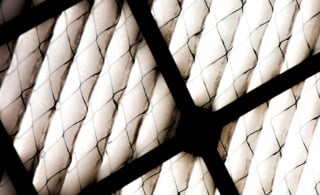 Types of Furnace Filters & How to Clean Them
Types of Furnace Filters & How to Clean Them 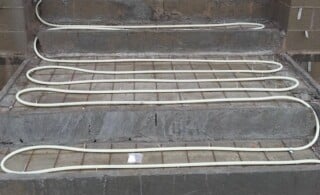 Radiant Floor Heating – How it Works & Benefits
Radiant Floor Heating – How it Works & Benefits 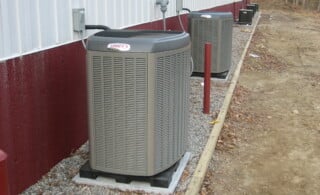 Central HVAC Maintenance – Tips & Advice
Central HVAC Maintenance – Tips & Advice 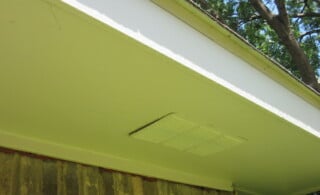 Increasing Attic Ventilation with Soffit Vents
Increasing Attic Ventilation with Soffit Vents 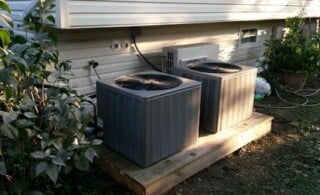 Green Air Conditioning
Green Air Conditioning 

This is a very good page with very useful information. I would add something about the variety of filtering systems and air handlers that each may/can use. My last house had conventional AC with a gas furnace and was just obnoxious… My current house has a combo heat pump/gas furnace with the ionic filter system and is silent (comes on slow/tappers up and down…) and keeps my whole house warm/cool on each floor from wall to wall (3500+ sq feet). Also, maybe some discussion about humidifiers and de-humidifiers (mine has both features) so my indoor humidity stays constant. The filtering and humidity systems options are especially interesting for folks with children, elderly, and respiratory challenged (ie. COPD and Allergies)… Basically…just expend on your original topics so people understand all the options/capabilities in environmental systems for residential. I even have a smoke detection system integrated into mine and remote and locally wireless controlled… Thanks for the great comparison…